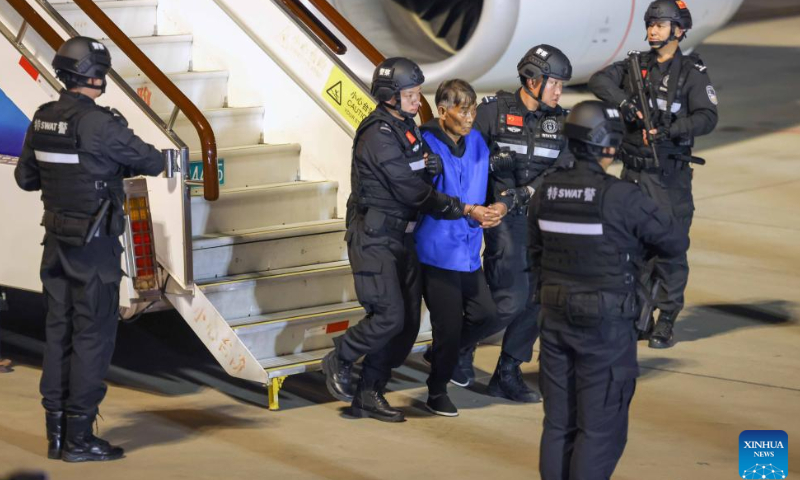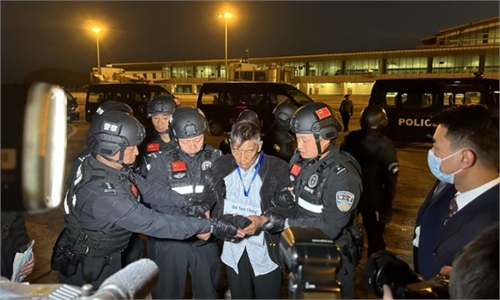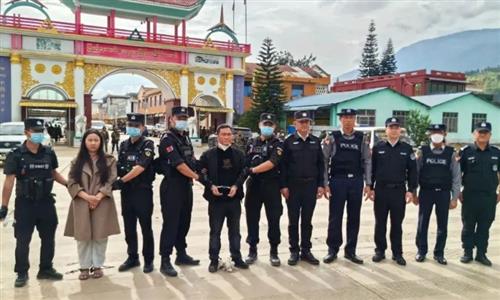Zero tolerance to presence of 'mafia families' at China-Myanmar border: Global Times editorial

Criminal suspect Bai Suocheng is escorted by Chinese police officers at the Kunming Changshui International Airport in Kunming, Southwest China's Yunnan Province, January 30, 2024. Photo: Xinhua
According to China's Ministry of Public Security, on the evening of Tuesday, 10 major criminal suspects handed over by Myanmar were successfully escorted back to China by Chinese public security authorities. Among them were Bai Suocheng, Bai Yingcang, Wei Huairen, Liu Zhengxiang, Liu Zhengmao, and Xu Laofa, who are important leaders of the Myanmar-based Kokang telecom fraud gangs. Together with the three individuals including Ming Guoping who were previously arrested and handed over to Chinese public security authorities, most of the important leaders of the "four families" of telecom fraud in northern Myanmar have been captured. So far, 44,000 suspects involved in telecom network fraud targeting China based in northern Myanmar have been handed over to China, including 171 masterminds, organizers, and key members, as well as 2,908 fugitives. This news is truly heartening, and netizens who strongly detest telecom fraud have praised this as a landmark achievement in the joint efforts of China and Myanmar to combat telecom fraud.
In recent years, telecom fraud in northern Myanmar has been particularly rampant, earning it the nickname "hell." Various scams, including the "pig butchering scam" and "illegal kidney trade" have emerged one after another, causing many Chinese families to suffer severe losses and even lose their lives. However, due to the region's unique history, politics, geography, and other factors, the various factions in northern Myanmar are complex. The combination of telecom fraud groups and local influences made it extremely difficult to combat telecom fraud. Led by the "four families," multiple criminal groups have brazenly set up fraud dens, openly armed themselves for fraud, and are also suspected of committing serious crimes such as intentional homicide, intentional injury, and illegal detention.
Therefore, the joint China-Myanmar crackdown on telecommunications fraud, symbolized by the collapse of the "four families," is significant. First, China is resolutely determined to safeguard the lives and property of the people and effectively maintain border security and stability. Combined with the thunderous actions of the law enforcement cooperation between China and Myanmar, even powerful forces like the "four families" are left with no outcome other than collapse. Second, the joint law enforcement actions of China and Myanmar serve as a certain demonstration for other countries in the fight against telecommunications fraud, and are bound to deter transnational criminals involved in telecom network scams. Third, in dealing with telecommunications fraud in northern Myanmar, there have been many noises from the outside attempting to sow discord in China-Myanmar relations with misinformation. This achievement serves as the best response to such noises.
In the border regions between China and Myanmar, there will absolutely be no tolerance for lawless "mafia" existence. Anyone with such intentions, regardless of their background, will inevitably face a heavy-handed cleanup by the law enforcement agencies of both China and Myanmar. The landmark achievement of the China-Myanmar joint crackdown on telecommunications fraud has eliminated a major destabilizing factor for the development of northern Myanmar. As mentioned earlier, over the years, telecom fraud and its related criminal activities in northern Myanmar have caused long-term damage to the security and stability of the China-Myanmar border. It has also continuously impacted normal border trade, personnel exchanges, and business activities between the two countries. Currently, the law enforcement actions of the China-Myanmar joint crackdown on telecommunications fraud have essentially dismantled the organizational structures and network of major fraud groups. This uprooting of the malignant tumor of telecom fraud, which had affected the development of northern Myanmar, is beneficial for both the development of the region and the restoration of normal bilateral activities.
Telecom fraud is a new issue that has emerged in the development of the bilateral relationship between China and Myanmar over the past 70 years. Although there have been previous experiences in joint efforts to combat drug trafficking, tackling the larger and more complex transnational telecommunications network fraud posed many specific challenges. Through multi-level and multi-faceted close communication and negotiations, the two sides have ultimately achieved this outcome of joint law enforcement, highlighting the profound foundation of bilateral relations. The traditional Pauk-Phaw friendship between China and Myanmar has weathered storms and challenges, but remained solid. The key lies in both sides consistently taking a long-term perspective, considering the bigger picture, and being able to mutually understand and respect each other in times of difficulty and challenge, maintaining friendly cooperation. The success of the joint anti-telecom fraud efforts between China and Myanmar gives us greater anticipation for the stable development of bilateral relations.
As an important neighboring country of Myanmar, China is undoubtedly the most eager for the stability and development of the country and is willing to work together with Myanmar to maintain peace and stability along the China-Myanmar border. While acknowledging the achievements in combating telecommunications fraud, it is also essential to recognize that such activities may be stubborn and complex, and the fight against telecommunications fraud cannot be accomplished in a single stroke. Maintaining the cooperation between China and Myanmar, which aligns with the common interests of both sides, will definitely leave no refuge for telecom fraud criminals and ensure the long-term security and stability of the China-Myanmar border region.


